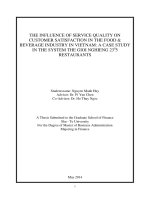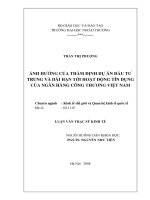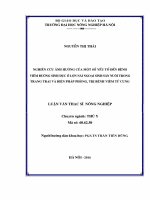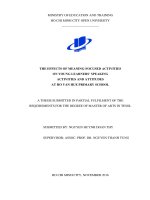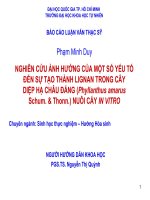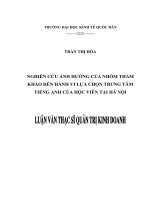luận văn thạc sỹ bằng tiếng anh the effects of role play on students’ english speaking ability and attitudesmotivations
Bạn đang xem bản rút gọn của tài liệu. Xem và tải ngay bản đầy đủ của tài liệu tại đây (260.08 KB, 116 trang )
Son La Department of Education and Training
Thuan Chau Junior High School
Thesis for the Degree of Master
The Effects of Role-Play on Students’ English
Speaking Ability and Attitudes/Motivation
-A Case of Thuan Chau Junior High School
Tran Trung Dung
ABSTRACT
Role-play has been widely used as a teaching method in the ESL/EFL
classroom. This research study aimed to
investigate
Thuan Chau Junior
High School EFL students’ attitudes/motivation towards the role -play course.
This study was designed to explore how role-play could increase Thuan Chau
Junior High School EFL students’ interests in learning English, improve their
English speaking proficiency, and overcome their shyness when speaking
English on stage.
During the one -month experiment, thirty-two (32) tenth graders in Thuan
Chau Junior High School in Thuan Chau District were divided into groups
according to their role-play dialogues used each week.
First, the participants
received the role-play instruction and then were required to perform role-play in
front of their classmates.
Both qualitative and quantitative methods were
conducted in this research.
Oral tests were given to participants to compare
their English speaking proficiency improvement prior to and following the
experiment.
The pre-course and post-course questionnaires were also given for
the purpose of assessing students’ attitudes/motivation toward role-play, and their
shyness overcoming. Additionally, in order to deeply understand how role -play
affected these participants, observations and interviews were also used as data
collection methods.
The result of the study showed that overall the participants had
positive attitudes/motivation toward the role-play course.
After the students
attended the role -play course, there was an obvious interest in learning English.
Inversely, the participants not only improved their English speaking proficiency
significantly but also overcame their shyness when speaking English on stage.
Based on the findings, this study produced several valuable contributions
to many different aspects of English education.
Therefore, this research
provided not only a framework for understanding how role -play affected
Thuan Chau Junior High School EFL students in learning English, but also
provided useful suggestions for junior high school English teachers, junior high
school ESL students, the Ministry of Education and Training, and researchers in the
field of TESOL.
Key words: role -play; speaking ability; learning attitudes/motivation; overcome shyness
ACKNOWLEDGEMENTS
It is a pleasure to thank the people who have helped me make this research
project a success: Professor Phan Thanh Duong, Professor Vu Sy Tuan, Professor
Pham Hong Chuong, Professor Le Thi Phuong, and my family.
Professor Phan Thanh Duong, as the Chairperson of the Department of
Applied Foreign Languages, provided me with useful academic guidance and
genial support. Furthermore, Professor Duong encouraged me to put an effort
toward developing my research skills.I sincerely appreciate the Chairperson’s
helping hand.
I give my appreciation to my advisor, Professor Vu Sy Tuan for guiding
me and encouraging
me
with
great
energy in
my
abilities. When I
encountered difficulties, Professor Tuan always gave me immediate support and
advisement. Professor Tuan was also an enthusiastic mentor for my conference
publication. I would not have been able to finish this thesis without Professor
Tuan’s help.
The members of my thesis committee, Professor Le Van An and Professor
Phan Manh Hung, who gave me useful suggestions and considerable
encouragements, were much appreciated.
Last but not least, I would like to thank my family, who supported me during
the thesis training and have been with me through all the ups and downs of my life.
Without their love and thoughtful understanding, I would not have completed this
achievement.
TABLE OF CONTENTS
ABSTRACT..........................................................................................................iv
ACKNOWLEDGEMENTS ..................................................................................vi
TABLE OF CONTENTS ..................................................................................... vii
LIST OF TABLES ..................................................................................................x
LIST OF FIGURES .............................................................................................. xii
CHAPTER I INTRODUCTION .........................................................................1
Background of the study .................................................................................1
Statement of the problem ................................................................................4
Purpose of the study ........................................................................................5
Research questions .........................................................................................7
Significance of the study.................................................................................8
Definitions of terms .........................................................................................9
CHAPTER II LITERATURE REVIEWS ...........................................................11
The disadvantages of the BCT .......................................................................11
The role of role-play in language learning .....................................................13
The influence of the attitudes/motivation.......................................................15
The development of language skills ..............................................................18
The facilitation of overcoming the shyness ...................................................19
Vii
CHAPTER III METHODOLOGY.........................................................................................23
Subjects ........................................................................................................23
Instruments ....................................................................................................25
Questionnaires ........................................................................................25
Lesson plan.............................................................................................25
Evaluation Form.....................................................................................25
Oral tests and interviews .........................................................................26
Teaching materials. .................................................................................27
Research Hypotheses .....................................................................................28
Procedures of the study .................................................................................28
The data analysis used in this study ...............................................................29
CHAPTER IV RESULTS...................................................................................30
Results of questionnaires ...............................................................................30
Results of oral tests .......................................................................................39
Descriptive data of interviews ........................................................................47
CHAPTER V CONCLUSION ..........................................................................55
Discussion .....................................................................................................55
Pedagogical implications ...............................................................................65
Limitations of this study.................................................................................68
viii
Suggestions for further research................................................................................................69
Conclusion.....................................................................................................70
REFERENCES ....................................................................................................72
APPENDIX A ......................................................................................................76
APPENDIX B .....................................................................................................77
APPENDIX C .....................................................................................................79
APPENDIX D .....................................................................................................80
APPENDIX E.......................................................................................................81
APPENDIX F ......................................................................................................82
APPENDIX G .....................................................................................................83
APPENDIX H .....................................................................................................84
APPENDIX I .......................................................................................................85
APPENDIX J.......................................................................................................86
LIST OF TABLES
Table 1 the interviewees’ personal information. … … … … … … … … … … …
… … … … … … 24 Table 2 Time table for the interviews. … … … … … … … …
… … … … … … … … … … … … … 27 Table 4.1.1 Comparison of
students’ attitudes/motivation toward role-play before and after the
experiment. .. ..31
Table 4.1.2 Comparison of students’ shyness while performing in front of their
classmates before and after the experiment. .. ...32
Table 4.1.3 Comparison students speak in L2 in daily time before and
after the experiment. 33 Table 4.1.4 Comparison of how hard words
students would use from role-play in their daily life before and after
the experiment. .. ..34
Table 4.1.5 Comparison of how anxious students feel while speaking English
before and after the experiment .....34
Table 4.1.6 Comparison of how confident students feel of their English ability
before and after the experiment. .. ...35
Table 4.1.7 Comparison of how calm and confident students were when they
performed in class before and after the experiment. .. ...36
Table 4.1.8 Comparison of how students feel when speaking English in public
before and after the experiment. .. ...37
Table 4.1.9 Comparison of how confident students feel about their pronunciation before and
after the experiment. ..
..................................................................................................................................................3
7
Table 4.1.10 Comparison of the cause of pause when students speak English before and after
the experiment. .. ..38
Table 4.2.1 Comparison of the influence of speaking ability before and after the
experiment...40
Table 4.2.2 Comparison of the using frequency of new vocabulary before and after
theexperiment. .. ..40
Table 4.2.3 Comparison of the accuracy of grammar usage before and after the experiment. 41
Table 4.2.4 Comparison of the listening ability before and after the experiment. .. ..42
Table 4.2.5 Comparison of students’ anxiety before and after the experiment. .....43
Table 4.2.6 Comparison of the ability of expressing him/herself before and after the
experiment. .. ..43
Table 4.2.7 Comparison of the accuracy of pronunciation before and after the experiment. .. 44
Table 4.2.8 Comparison of the accuracy of tense usage before and after the experiment. .. .45
Table 4.2.9 Comparison of the pause frequency while interviewing before and after
theexperiment. .. ..45
Table 4.2.10 Comparison of how students were out of idea during the oral tests. ....46
Table 4.3.1 The checking list… … … … … … … … … … … … … … … … … … … … … … … … … 54
LIST OF FIGURES
Figure 1: Procedure of this study… … … … … … … … … … … … … … ....................28
CHAPTER I
INTRODUCTION
Background of the study
The most important examination for junior high school students in Vietnam is the Basic
Competence Test (BCT).BCT is the main entrance exam for junior high school students
to go to senior high schools. All of the applications or recommendations will depend
upon the BCT grade. “All the graduating students of junior high schools will be
distributed according to the results of Basic Competence Test. The grading procedure
includes assignation, recommendation,applcation into senior high school, and so on”
(Ministry of Education and Training, 1999). Although the Grade 10,11, 12, Curriculum
Guideline focuses on four skills, i.e. listening, reading, speaking, and writing, the content
of BCT still covers only grammar and reading. A common mistake many teachers and
students make is that they pay more attention to what the BCT is focused on. “Traditional
English education in Vietnam placed an emphasis on reading skill” (Adian Doff, 2002,
p.3). Furthermore, “most junior high school English teachers used the grammar
translation teaching method in their classrooms to meet the expectations of the
national curriculum” (Adian Doff, 2002, p.3). The truth is that the only goal for most
junior high school students is to go to senior high schools. In this case, BCT becomes the
students’ main goal, rather than other important and basic English skills. There is thus
discrepancy between students’ English speaking ability and their BCT proficiency.
Furthermore, BCT often discourages students from speaking in class. To encourage
students to talk in class is one of the ways to help them learn a second language. “The
more students talk, the better they learn” (Seliger, 1977). Role-play is one of the
teaching methods which help students talk more in class. “Role-play enables all
students to be actively involved in the lesson” (Downing, 1994, p.5).During role
-play, students have to go on the stage and perform, so they must speak English in
class. In this case, role-play forces students to concentrate and talk in class actively.
English role -play also enhances three other important aspects of the students’ ability to
speak English: affecting attitudes/motivation positively, improving language skills, and
overcoming shyness. Attitudes/motivation is one of the most important reasons for
students to learn at school, and it also influences students in learning a second language.
“Unquestionably, motivation and attitude are very important in language learning
success” (Scacella & Oxford, 1992). According to Scacella and Oxford,
attitudes/motivation is very important while students are learning a second language;
the researcher would use role-play to raise students’ learning attitudes/motivation.
Additionally, it is necessary to create a safe environment in which students can learn a
second language. “… in a safe and supportive classroom… students feel comfortable
taking risks because they know that they will not be embarrassed or criticized if they
make a mistake” (Dornyei, 2001, p.56). Students will feel safe and be more willing to
speak out in class if they have the teachers’ support and do not feel stressful. Role-play
aims to increase students’ confidence and affect attitudes/motivation positively to excel in
English. “Role-playing stimulates realistic conversation and effective communication in
foreign language learners in particular” (Abdullan & Elhami, 1997, p.43). This is also
the goal for
teachers to teach and students to learn a second language. Teachers should always
make it a
goal to use a range of teaching methods to help students speak out in class. It is
important
that the teacher challenges students to use their English knowledge for simple
conversation in
daily life. As for students who have the same thoughts as teachers do, most of them
would
hope to have conversation skill when they need to use it. Many common teaching
methods
do not offer this function, but role-play does. Teachers should always encourage
students to
act out the roles of dialogues in their textbooks so they gradually become familiar with
the
content. This will also enable students to accustom themselves with normal
conversation in
their lives.
In addition, a challenging aspect of role -play requires students to act in
front of their
classmates.Students should feel less pressured if the teacher creates a safe
environment
within which they can perform.This would be the most beneficial to shy or
withdrawn
students. Therefore, this research study examines how role -play affects
students’
learning
attitudes/motivationsignificantly,improvestheirEnglish
proficiency and helps them overcome shyness. We can also see plenty of other
benefits in using role -play as a teaching method. Statement of the problem
Role-play is a very common teaching method for teachers to use.
It is
widely used in foreign countries, especially for junior high school students.
Following from the introduction, we know that most students study English for
the purpose of the BCT. For that reason, most of the students in Vietnam can read
English but seldom speak it. Many are thus unable to talk to native English
speakers out of the classroom. There is very little research examining how role
-play affects the speaking ability of junior high school students. In Vietnam,
much of the research examines role-play focuses on junior high school students
in foreign countries, such as Hong Kong, Japan, and Korea. There is currently
very little research exploring the benefits of role-play on junior high students in
Vietnam. There is also very little research pointing out how role-play influences
students’ learning attitudes/motivation.Most researchers talk about “using
work,
group
pair
work, or cooperative learning activities [student-centered
learning], helping in not putting too much pressure on individual students in front
of the whole class ” (Scarcella & Oxford, 1992, p.54), or encouraging and
stimulating students.
In addition, a great deal of research shows that different
aspects of attitudes/motivation vary in important points.
For example, “internal,
cognitive and affective aspects of motivation might be more important in foreign
language contexts, where most of the language learning took place in the formal
classroom” (Schmidt et al., 1996; Dornyei, 1996).
There is little research that
indicates how role-play could influence students’ learning attitudes/motivation
directly.
There is little research explaining how students overcome shyness and
withdrawal.
The research explains how students’ shyness is minimized to the point that role
-play can help
students conquer this natural feeling.
Most of the researchers talk about students’
shyness,
and the way that teachers treat those shy students, such as “(1) minimizing
stress or
embarrassment, (2) engaging shy students in special activities, (3) changing
the social
environment like seating them among friendly classmates, (4) encouraging or
shaping
increased responsiveness, (5) involving them in frequent private talks” (Lacina
-Gifford et al.,
2002, p.7).
Again, this research does not show direct evidence indicating that
role-play can
help students overcome shyness. Therefore, this particular research is intended to
highlight how little research has gone into three areas.
Firstly, little research
concerns role-play as the teaching method for junior high school students in
Vietnam. Secondly, little research shows how role -play has a direct effect on
attitudes/motivation.Thirdly, research seldom presents that role-play can help
withdrawing students to overcome their nervousness.
Purpose of the study
In spite of the possible teaching methods that may help students learn a second
language, there is still a need to discover other teaching methods that students
would prefer.
Due to the fact that BCT focuses more on reading and writing
comprehension, there is an obvious lack of focus in the areas of speaking practice.
Therefore, there are three purposes in this research study: improving students’
language skills, affecting students’ learning attitudes/motivation positively, and
helping students overcome shyness in their speaking.
Many junior high school students in Vietnam study English in order to enter
good senior high schools. Therefore, teachers and students often strictly adhere
to the BCT curriculum. In this case, students may lose focus developing their
speaking ability.
The BCT focuses on grammar and reading.
Although both
grammar and reading are very important in learning a second language, teachers or
students should not ignore other language skills.
main method of communication in daily life.
Furthermore, speaking is the
One of the main focuses of this
research study is the use of role-play to help students improve their speaking
ability, so that they can have a better use of English in practical every day
situations.
Therefore, the first purpose of the study is to explore how role-play
affects students’ English proficiency. As for improving students’ learning
attitudes/motivation, the researcher discovers that many students in Vietnam have
poor attitudes/motivation while learning a second language, because of the boring
teaching methods used in the classroom. Most of the teachers offer a great deal
of paper tests and reading articles for students, so these affect students’
attitudes/motivation. What the researcher hopes to work on in this part is to use
an active teaching method to influence their learning attitudes/motivation
positively. “A key requirement of role -playing is that all students be actively
involved” (Chu Quang Binh, 1993, p.3). Hence, the second purpose of the
study is to claim how role -play affects students’ attitudes/motivation in
learning L2. The third part is to help students overcome their shyness. One of
the reasons that students seldom use English or talk to native English speakers
in daily life is that they are often afraid to do so. Allowing students to act out the
roles in the dialogues in class offers them more opportunities to speak out in
English. It may also help students overcome their shyness.
Through this kind
of training, the researcher hopes that students would become brave enough to use
English in their everyday lives, and be able to converse freely with native English
speakers.
Thus, the third purpose of this study is to examine how role
-play overcomes students’ shyness. In summary, the purpose of this study is
to
improve
language
skills,
affect attitudes/motivation significantly, and
overcome shyness of students by using role-play as the teaching method.
Research questions
There are three research questions to be addressed in this study:
1. What is the value of the English speaking proficiency improvement
of Thuan Chau Junior High School tenth graders after they attended the role
-play course?
